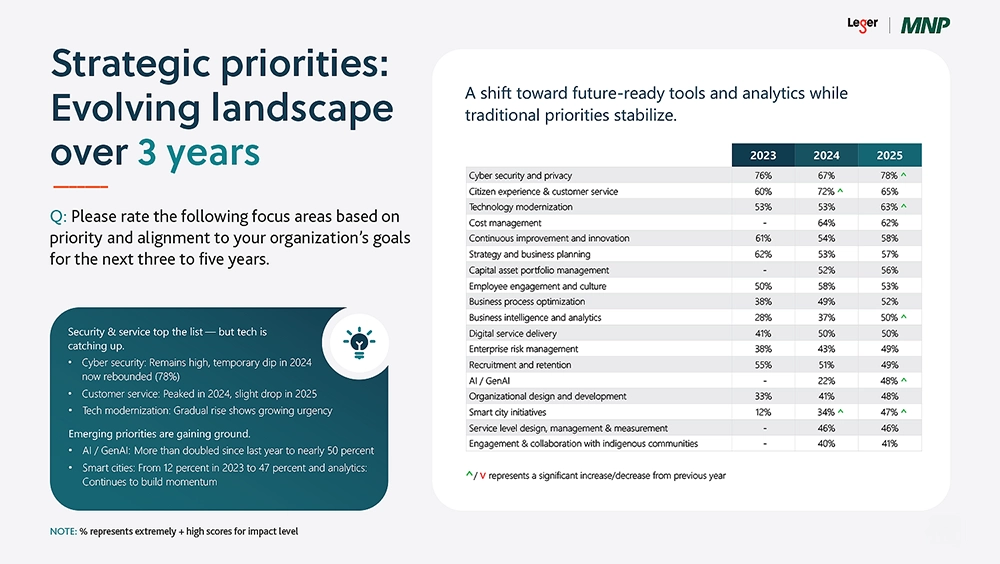As modernization climbs higher on municipal priority lists, leaders are turning to AI-enabled ERP systems to simplify operations and support smarter governance. Learn how upgrading core platforms can unlock new efficiencies, strengthen data governance, and empower teams to make confident, evidence-based decisions that deliver real value to their communities.
When legacy systems hold progress back
For many municipalities across Canada, legacy enterprise resource planning (ERP) systems have long anchored financial management, procurement, and human resources. But as expectations for efficiency, transparency, and digital services delivery grow, those same systems are showing their age.
Manual data entry, paper-heavy workflows, and siloed information make it harder to respond quickly to council priorities or emerging community needs. Yet, as the 2025 MNP Municipal Report found, legacy technology systems and applications continue to be a leading operational hurdle, with 43 percent of respondents citing them as a top challenge. And another 49 percent identified replacing legacy technology as one of their leading modernization priorities. These issues continue to affect how municipalities govern, budget, and serve their communities every day.
The next evolution of ERP is already underway. Throughout the country, municipalities are replacing platforms such as Diamond, Bellamy, or Microsoft Great Plains with modern, cloud-based systems like Sylogist, designed to integrate artificial intelligence (AI) capabilities that streamline processes and enhance decision-making
How AI turns data into daily decisions
Today’s enterprise resource planning (ERP) platforms are no longer limited to transactional processing. They now include integrated AI capabilities such as machine learning, natural language processing, and predictive analytics as foundational components that enhance how data is captured, analyzed, and applied across municipal operations. These features allow municipalities to automate routine tasks, identify anomalies proactively, and convert raw data into actionable intelligence. This integrated AI is transforming how municipalities interact with their data by enabling greater insight, efficiency, and responsiveness. For example, predictive analytics can combine historical data with economic indicators and environmental factors to support more accurate budgeting and planning. Intelligent automation can process invoices, payroll, and vendor payments in minutes rather than days. Natural language tools can enable chatbots to handle common citizen inquiries or assist staff with data retrieval, freeing people to focus on higher-value work.
These capabilities are not meant to replace human expertise but rather amplify it. They help municipal teams work faster, anticipate issues earlier, and base decisions on evidence rather than assumptions.
Inside the change: what modern ERP really does
To understand the difference, consider a few real-life examples of how AI-enabled ERP systems are transforming day-to-day municipal work:
Finance Manager
Before AI: Budget forecasting required hours of manual reconciliation in spreadsheets, and preparing quarterly reports.
With AI: Predictive models now provide real-time budget performance visualizations, highlight anomalies, and suggest adjustment based on trends. Finance managers can now focus more on advising Council and less on manual number-crunching.
Procurement Officer
Before AI: Contract management was manual and reactive, often relying on email records or spreadsheets.
With AI: Centralized dashboards flag upcoming renewals, highlight non-compliant clauses, and identify supplier risks using historical performance data. AI tools also assist in drafting new contracts using standardized templates and clause libraries, ensuring alignment with municipal policies and legal requirements. Officers can now focus on strategic sourcing and value optimization instead of chasing paperwork.
HR Specialist
Before AI: Responding to employee inquires and tracking leave requests consumed much of the day.
With AI: Virtual assistants and workforce analytics can identify skill gaps and retirement risks, also providing recommendations for training programs and recruitment strategies. This allows HR specialists to focus on strategic workforce development.
Asset Management Supervisor
Before AI: Manually checks asset logs and paper-based records to assess equipment status. Coordinates with field teams via phone or email to assign work orders and confirm availability.
With AI: Logs into a centralized dashboard displaying real-time asset health, pending work orders, and team availability. Reviews predictive maintenance alerts generated by AI, prioritizing tasks based on risk and urgency.
While the AI capabilities across different ERPs may be unique to each solution, each of these examples highlight the potential time that can be saved, insights that can be gained, and resources that can be are redirected toward more strategic goals.
The barriers we don’t talk about enough
Even with clear benefits, modernization doesn’t come without challenges. Organizational culture, limited budgets, and regulatory complexity often can slow the pace of change. Nonetheless, things are gaining traction. According to the 2025 MNP Municipal Report, technology modernization climbed ten points in priority in 2025, reaching 63 percent of respondents. This shows municipalities are shifting their focus toward future-ready tools and analytics while traditional priorities begin to stabilize.
Data governance remains another major barrier. Many municipalities have accumulated years of unstructured information across disconnected systems. Migrating that data safely into a new ERP requires cleaning, validation, and clear ownership model. Without it, even the best technology can underperform.
*Source: 2025 MNP Municipal Report
The same report shows that while collaboration within municipal teams is improving, new internal pressures are forming. The share of respondents who identified regulatory requirements as a barrier has climbed steadily since 2023, while subject-matter expertise gaps have risen by nine points in a single year. These challenges are compounded by resource limitations and outdated governance policies that slow decision-making and project execution.
Modernization, then, is as much about people and process as it is about technology. Building the right foundations, from workforce planning to policy alignment, is what ultimately determines success.
Laying the groundwork for a smoother transition
Every successful ERP transformation begins with preparation. Before migrating to a new platform, municipalities should evaluate their current systems and data governance practices, to identify clear goals and outcomes for how this transformation will further enable a culture of data-driven decision-making.
Creating clear policies and defining data ownership ensures smoother transitions and future accountability. It’s also essential to understand regulatory requirements, particularly as AI tools become more embedded in municipal operations. Staying informed on evolving AI and data-privacy guidelines will help municipalities design systems that meet both performance and compliance needs.
For those ready to take the first step, solutions selection and road mapping are key. Partnering with experienced advisors who can assess existing platforms, recommend replacements like Sylogist or Microsoft Dynamics, and align implementation with operational goals can make the difference between a technology upgrade and a full organizational improvement.
From modernization to meaningful improvement
ERP modernization helps municipalities strengthen operations, improve adaptability, and deliver services with greater precision and accountability. When implemented strategically, AI-enabled platforms can strengthen forecasting capabilities, streamline procurement processes, and improve responsiveness to citizen needs.
Looking ahead, municipalities are finding that modernization works best when it is deliberate. Municipalities are recognizing that successful modernization requires deliberate planning. Conducting a thorough assessment of existing systems, reinforcing data governance practices, and selecting scalable, future-ready technologies can transform an ERP upgrade into a long-term investment in transparency, efficiency, and informed decision-making.
Key takeaways
- Modern ERP systems enhance forecasting by strengthening accuracy and automates routine tasks.
- Strong data governance builds trust and improves decision quality.
- Modernization promotes transparency and collaboration across departments and operations.
- Scalable platforms give municipalities flexibility to evolve with new needs.
- AI-enabled tools free teams to focus on strategic priorities and citizen service.
For a closer look at how legacy technology continues to transform municipal performance and where modernization offers the greatest opportunity, explore the findings of the 2025 MNP Municipal Report.
Connect with us to get started
Our team of dedicated professionals can help you determine which options are best for you and how adopting these kinds of solutions could transform the way your organization works. For more information, and for extra support along the way, contact our team.

